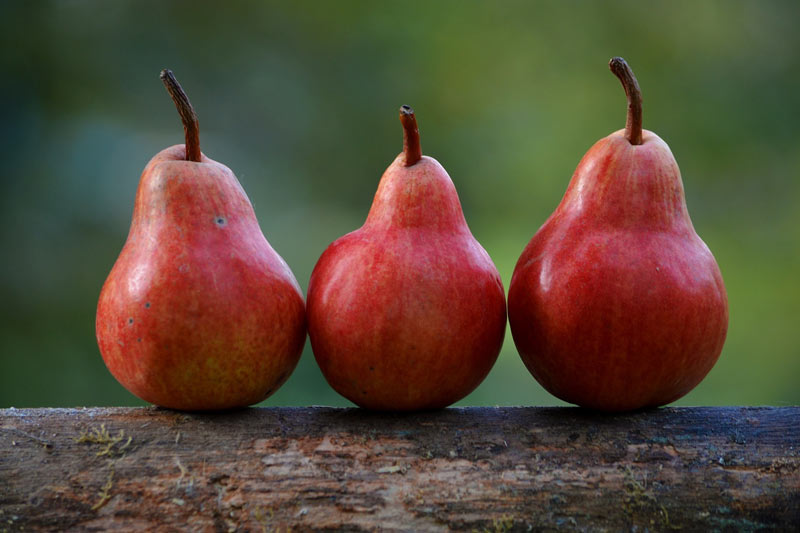
According to the American Nutrition Association1, 70 million people around the world suffer from some sort of digestive problem. These issues affect their ability to eat, their ability to absorb nutrients, and even their quality of life. Many can be treated with over-the-counter medications, such as antacids, but these only address the symptoms. They do nothing about the underlying cause of the discomfort or pain.
Thankfully, there are natural ways that sufferers can find relief. One of the most surprising might be the fact that eating pears, particularly poached pears, can help alleviate your digestive troubles.
Common Digestive Issues
As mentioned, tens of millions of people around the world suffer from a host of different digestive issues. Some of the most common include:
- Heartburn
- Acid reflux
- GERD
- Irritable bowel syndrome
- Constipation
- Indigestion
- Abdominal pain
Common Treatments for Digestive Problems
In an effort to treat these all-too-common ailments, Western medicine has created a host of options. Antacids, both chewable and liquid, are staples in most homes today. There are also higher-strength medications, such as Prevacid® or Nexium®, which are proton pump inhibitors (PPIs) that actually help stop the stomach from producing acid. The problem with PPIs is that stomach acid is necessary to absorb calcium. Taking a PPI for any length of time can prevent the body from absorbing calcium and other nutrients, leading to osteoporosis and other problems.
Thankfully, there are natural solutions that can help to ease stomach pain or discomfort, reduce heartburn, and help improve your quality of life. For instance, mint has been shown to reduce the symptoms of heartburn and indigestion. However, there’s an even better option (and one that’s much tastier than chewing a handful of mint leaves). Poached pears can provide you with the relief you crave, as well as a sweet treat that doesn’t harm your body.
Why Pears?
So, why choose pears of all things to combat your digestive health issues? Actually, pears have long been hailed for their nutritional value and impact on our health2. For instance, a single pear can provide 16% of your RDA of copper, 12% of your vitamin C, 6% of your vitamin K, 4% of your daily fiber intake, as well as 6 grams of fiber.
In addition to the nutritional value, there’s evidence that pears can promote gut health. The fiber content in pears (both soluble and insoluble) helps prevent and alleviate constipation and also supports the growth of beneficial bacteria in the gut which can help to alleviate other digestive health issues.
Another reason that pears can help with digestive health issues3 is that they contain powerful anti-inflammatory agents. These antioxidants can help to reduce the risk of disease by fighting the inflammation that leads to dangerous conditions like heart disease and diabetes, as well as Crohn’s disease, IBS, and gut-related issues.
The fiber and antioxidants found in pears can decrease bloating and prevent water retention, but also encourage improved colon health. Powerful phytonutrients help to protect your colon and other digestive organs from oxidative stress, balance your body’s pH levels, and more.
Pears in Traditional Medicine
For those more used to Western medicine, it might seem strange to think of a sweet fruit as being a medical treatment, but pears have been used for thousands of years in both Ayurvedic treatments and in traditional Chinese medicine (TCM)4. In Eastern medicine, pears have been used for over 3,000 years to promote regularity and improve gut health, and even to fight fevers.
In Ayurvedic tradition, pears are used to support body tissue health, improve nutrient access, and to build strength. Note that raw pears are preferred, particularly with the skin on. However, cooked pears can work as a good substitute for other sweet foods, thereby reducing your sugar intake, which offers its own health benefits.
What Pears to Use
If you’ve taken a tour around the produce department of your grocery store, you’ve no doubt noticed that there are many different types of pears available today. Should you go with Bartlett pears? What about Anjou pears? Actually, the variety doesn’t really matter that much. All varieties of pears have similar nutrient and antioxidant levels5. It’s really more about taste and texture, particularly if you’ll poaching them. When cooking pears, you’ll want to use a firmer variety, such as Bosc pears or Conference pears. Softer pears do not hold up as well and may turn to mush.
How to Poach Pears
Not sure how to poach pears? It’s not that difficult. Just follow the recipe below for a single serving treat:
- 1 firm pear
- 150 ml water
- 1 tsp. grated ginger
- 1 tsp. monkfruit sweetner
- Sea salt
Peel, core, and quarter the pear. Bring the water to a simmer in a pot on the stove. Add the pear quarters and a few grains of sea salt. Simmer until tender, or about 10 minutes. Make sure the pear pieces are core side up – add the monkfruit sweetner to the core depression and then sprinkle the ginger over the pears. Cook for another two minutes. Serve warm.
The recipe above is just one variation. There are dozens of poached pear recipes out there. Many of them combine apples and pears, or dates and pears, to create more complex flavors and add even more to the health benefits. Note that you’ll find a number of recipes that include ice cream or very sweet syrups. These should be avoided as the extra sugar can negate some of the health benefits found with pears.
In Conclusion
In the end, fighting common digestive health issues may not require over-the-counter treatments or even prescription medications. Pears, eaten raw or poached, can help improve your digestive health, add fiber to your diet, increase your nutrition, and introduce powerful antioxidants that can combat oxidative stress6.
Source:
- http://americannutritionassociation.org/newsletter/digestive-issues
- https://www.medicalnewstoday.com/articles/285430.php
- https://www.healthline.com/nutrition/benefits-of-pears#section3
- https://theholistichighway.com/meals-that-heal-poached-pears-with-sweet-orange-and-date-glaze/
- https://draxe.com/nutrition/fruit/pear-nutrition/
- https://www.organicauthority.com/eco-chic-table/5-juicy-reasons-to-eat-healthy-pears
